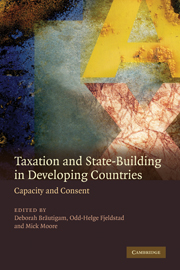Book contents
- Frontmatter
- Contents
- List of figures and tables
- List of contributors
- Acknowledgements
- 1 Introduction: taxation and state-building in developing countries
- 2 Between coercion and contract: competing narratives on taxation and governance
- 3 Capacity, consent and tax collection in post-communist states
- 4 Taxation and coercion in rural China
- 5 Mass taxation and state–society relations in East Africa
- 6 Contingent capacity: export taxation and state-building in Mauritius
- 7 Tax bargaining and nitrate exports: Chile 1880–1930
- 8 Associational taxation: a pathway into the informal sector?
- 9 Rethinking institutional capacity and tax regimes: the case of the Sino-Foreign Salt Inspectorate in Republican China
- 10 Tax reform and state-building in a globalised world
- References
- Index
6 - Contingent capacity: export taxation and state-building in Mauritius
Published online by Cambridge University Press: 22 September 2009
- Frontmatter
- Contents
- List of figures and tables
- List of contributors
- Acknowledgements
- 1 Introduction: taxation and state-building in developing countries
- 2 Between coercion and contract: competing narratives on taxation and governance
- 3 Capacity, consent and tax collection in post-communist states
- 4 Taxation and coercion in rural China
- 5 Mass taxation and state–society relations in East Africa
- 6 Contingent capacity: export taxation and state-building in Mauritius
- 7 Tax bargaining and nitrate exports: Chile 1880–1930
- 8 Associational taxation: a pathway into the informal sector?
- 9 Rethinking institutional capacity and tax regimes: the case of the Sino-Foreign Salt Inspectorate in Republican China
- 10 Tax reform and state-building in a globalised world
- References
- Index
Summary
Introduction
In development theory and practice, export taxation has a generally bad reputation. Economists point out that export taxes penalise a sector that should be encouraged. The United States has tabled proposals in the World Trade Organisation (WTO) that would force the repeal of export taxes for most countries. In natural resource-rich economies, a state's reliance on revenues from natural resources (whether ‘taxed’ or simply brought into the coffers as ‘rents’) seems to lead to something widely called the ‘resource curse’. High taxes on agricultural exports were one of the major factors identified by Robert Bates (1981: 11–29) in his analysis of the politically rational but economically perverse policies pursued by African rulers.
For all of these reasons, export taxes – and in particular, the taxation of agricultural exports – have been on the wane in the developing world (Tanzi and Zee 2000b: 307 n. 24). In many cases, this is no doubt a positive development, although their replacement by taxes such as the Value Added Tax (VAT) has been the source of much political protest. However, a closer look at export taxes reveals a more complex story that suggests a surprising conclusion: taxes on agricultural exports have the potential to play a wide variety of positive state-building roles. They may directly reinforce democratic representation and accountability.
- Type
- Chapter
- Information
- Taxation and State-Building in Developing CountriesCapacity and Consent, pp. 135 - 159Publisher: Cambridge University PressPrint publication year: 2008
- 13
- Cited by

